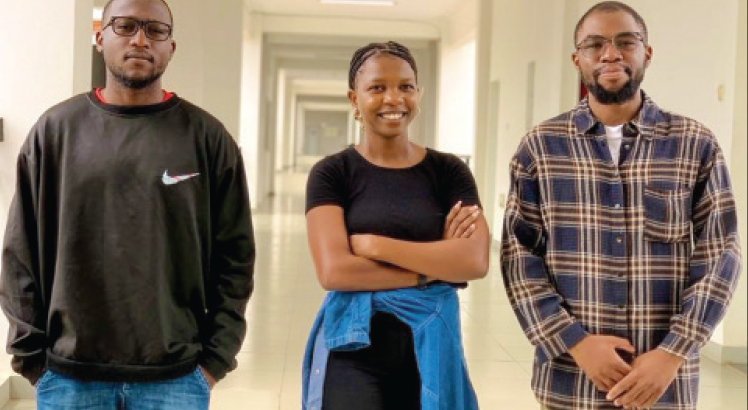Sanitary pad from banana stem?
A trio peeling banana stems plant to fashion fluffy pads for keeping period poverty in check wins Malawi University of Science and Technology (Must) innovation contest, writes our Staff Writer JAMES CHAVULA:
Ellanive Njelenje is a Malawi University of Science and Technology (Must) innovation hero with sanitary pads made from banana stems.
The 23-year-old metallurgy and material engineering student works with her fifth-year classmates Leonard Mawaya and Gomezgani Matonga to perfect the idea.
The team surpassed 13 other pitches in the K27 million battle of brains supported by the United Nations Children’s Fund (Unicef).
Their idea dazed five judges looking for innovations for the good of women and children during emergencies.
The top five concepts will get K2 million to K8 million for testing, patenting and perfecting the innovations.

Common reality
The only female in the triumphant trio narrated how poverty pushed her to use pieces of cloth for sanitary pads on her debut menstruation.
“The piece of cloth was discomforting and smelly. The experience made me more determined and creative to beat poverty,” she recounts.
Ellanive’s father migrated to South Africa when she was six years old.
“My mother raised my three siblings and I single-handedly since Standard Two,” she says. “An Italian missionary supported the single mother, who cared for children at Andiamo in Balaka Town, to keep me in school until Standard Seven.”
Ellanive recalls: “My mother, who earned K13 000 a month, almost gave up on my education. Then nuns from Bakhita Girls Secondary School pledged half of my fees.
“Mom couldn’t raise her cut even when the good nuns reduced it to K30 000. She had to feed us, so sanitary pads weren’t on the budget.”
Having made it to university, Ellanive says the nightmare fanned a burning desire to create a better world for every girl to keep learning regardless of monthly periods.
“I was determined to change not just my life. Seeing the deteriorating situation and mom’s suffering, I didn’t want to be in her shoes but to take her and fellow girls out of poverty,” she explains.
Two years ago, she teamed up with the two male students and started experimenting with banana fibre to end the nightmare associated with the monthly experience women and adolescent girls cannot wish away.
They peel the overlapping sheath of a banana plant that looks like a trunk, extract fibres and soak them in water all day. Then they boil the yarn in chemicals to remove residues and compress the fluff fibres into a wool-like layer that absorbs fluids.
“The soft tissue makes the pad friendly and handy for girls likely to skip classes for days during menstruation,” she says.
With the grant from Unicef, the students will fabricate machines for extracting and compressing fibres. They will also buy raw materials, including banana stems from farmers.
Ellanive states: “We are sharing the money with surrounding communities while searching for a solution to menstrual poverty and plastic waste polluting our beautiful country.
“Up to 90 percent of sanitary pads sold in shops is plastic which doesn’t decompose for decades. The banana fibres decompose quickly,” she says.
Must director of research and outreach Professor Alfred Maluwa expects the biodegradable pad to make menstrual hygiene affordable.
“Disasters disrupt livelihoods, but menstruation continues. The affected women and girls experience problems in crowded camps, with some learners failing to go to school because they cannot afford sanitary pads,” he says.
The pad personifies the rise of the Chinese-built university at ex-president Bingu wa Mutharika’s Ndata Farm in Goliati, Thyolo District, into an innovation hub.
Powering solutions
Unicef Malawi helps public universities to improve research and innovation.
“Under one of those initiatives, Unicef supported Must in building the research capacities of young people to bring innovative, sustainable and evidence-based solutions for issues impacting young people and women in their communities,” says Unicef Malawi chief of research and knowledge management, Dr Mussarrat Youssouf.
This is one of the 82 research projects by Must, one of the Africa Drone and Data Academy.
The academy uses drones for vaccine delivery in hard-to-reach areas. The unmanned planes took to the skies to strengthen search and rescue during the devastating Cyclone Freddy last year.
However, the new partnership challenged young minds to develop more innovations for humanitarian use.
“Must learners and youthful lecturers submitted over 40 proposals, from which we selected 14 groups to pitch their ideas on February 22 this year. None of the lecturers made it to the top five, so the learners could be more innovative than their tutors,” Maluwa states.
The audience included guests from the Malawi Council for Disability Affairs, Back to School Foundation, the Malawi Bureau of Standards and Matapwata Community Day Secondary School nearby.
The judges led by Must head of engineering, rated every pitch’s potential to solve health problems, get replicated beyond the university and promote inclusiveness.
“We want the innovations to be up to standard, relevant to the nation and user-friendly for persons with disabilities and people in remote communities,” Maluwa says.
The top five also included a locally made filter for purifying water from boreholes and soap that unleashes the power of enzymes from fruit leftovers to improve hand hygiene. Others are Stem Quest Club which supports girls in schools surrounding Must to like sciences and a digital application for screening cervical cancer using artificial intelligence (AI).
No plastic solution
The top team is optimistic that the affordable pad will reduce menstrual poverty before decomposing.
They estimate a pack of 10 to cost K750, more than half the shelf price of factory products coated in plastic.
Ellanive says: “Plastic pollutes our country, so we envisage low-cost sanitary pads that are friendly to girls and the environment.
“The biodegradable sanitary pads don’t cause any irritation, unlike the rags that expose users to infections, shame, and low self-esteem.”





